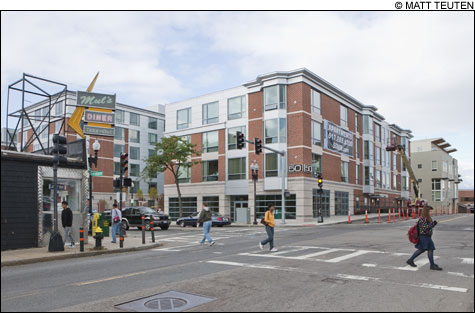“It comes down to economics,” says a long-time African-American resident of Boston (she requested anonymity due to her work in community development for a local university). “In another time and place in history, the owner of a bar could have closed down for the night and not served these men because they’re gay. But who in these tough times would do such a thing? The bar owner probably has a mortgage to pay and his kid is in a Catholic private school around the corner. To him, it ain’t about black, white, or gay. It’s about green — and if you got green, you can do what you want.”

THE NEW SOUTH END? As new condominiums and other developments spring up all over South Boston’s historic streets, affluent young professionals — many of them gay — are moving there and changing the face of the neighborhood. |
Southie 101
For those requiring an intro class or even a refresher, Southie has historically been a working-class, Irish-Catholic section of Boston with a vibrant political culture that produced such figures as Mayor Ray Flynn, former State Senate president William Bulger, Congressman Stephen Lynch, and the likes of Bulger’s brother Whitey and his peers in the annals of Irish-American organized crime. It has been a symbol of blue-collar Boston natives and Irish immigrants, who have lionized their favorite sons in sport or pop culture. But it’s also forever entangled in the watershed school-busing crisis of more than three decades ago.
Back in the 1970s, Southie became the new ugly face of racial tension in this country when federal courts ordered the busing of underprivileged black kids from Roxbury to the headstrong Irish enclave, and conversely, the busing of South Boston teens to an also tense Roxbury High. True to form, Southie residents decided to ignore the federal-court order, resulting in both neighborhoods becoming the unruly scene of back-and-forth violent racial incidents, leaving some victims severely beaten or violently stabbed. That tension and violence was, in fact, citywide, but because Southie was so politically active, it came to symbolize resistance to busing and racial integration. This left Southie itself as the victim with the deepest scars, as well as with a lasting negative reputation and a legacy of intolerance that many are quick to finger as the root problem when similar situations arise.
The segment of the South Boston population that organizes the annual St. Patrick’s Day Parade has certainly not helped shed that perception. Infamously in 1992, parade organizers denied an Irish LGBT organization the right to march in the parade. Soon after, through the court system, the LGBT group won the right to march, which led to swirling rumors of the violent retaliation it would face. And that, in turn, prompted a Supreme Court decision, which recognized the “freedom of association” of the parade organizers to pick and choose who could participate in the parade. Never mind the rights of the gay participants to march in a parade celebrating what was also their heritage.